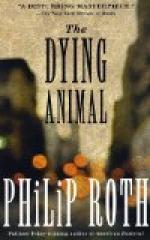|
This section contains 2,387 words (approx. 8 pages at 300 words per page) |

|
SOURCE: Gessen, Keith. “The Professor of Desire.” Nation 272, no. 23 (11 June 2001): 42-4.
In the following review, Gessen compares Roth's writing to that of Leo Tolstoy and views The Dying Animal as an extended essay about Roth's recurring theme of sexual relations.
When Philip Roth compiles lists of the writers he most admires, Tolstoy never seems to make it. There's Flaubert, Kafka, Bellow—the touchstones. Gogol, Dostoyevsky, Céline—the madmen. Henry Miller, of course; even Chekhov and Thomas Mann. But Tolstoy, when he appears in Roth's fiction at all, is usually something of a joke. In The Ghost Writer, young Nathan Zuckerman travels to meet his hero, the reclusive novelist E. I. Lonoff (“Married to Tolstoy” is how the novel describes the plight of Lonoff's wife); lying the first night in the sanctum where Lonoff composes his masterpieces, and knowing that a fetching student of Lonoff's is also staying...
|
This section contains 2,387 words (approx. 8 pages at 300 words per page) |

|


